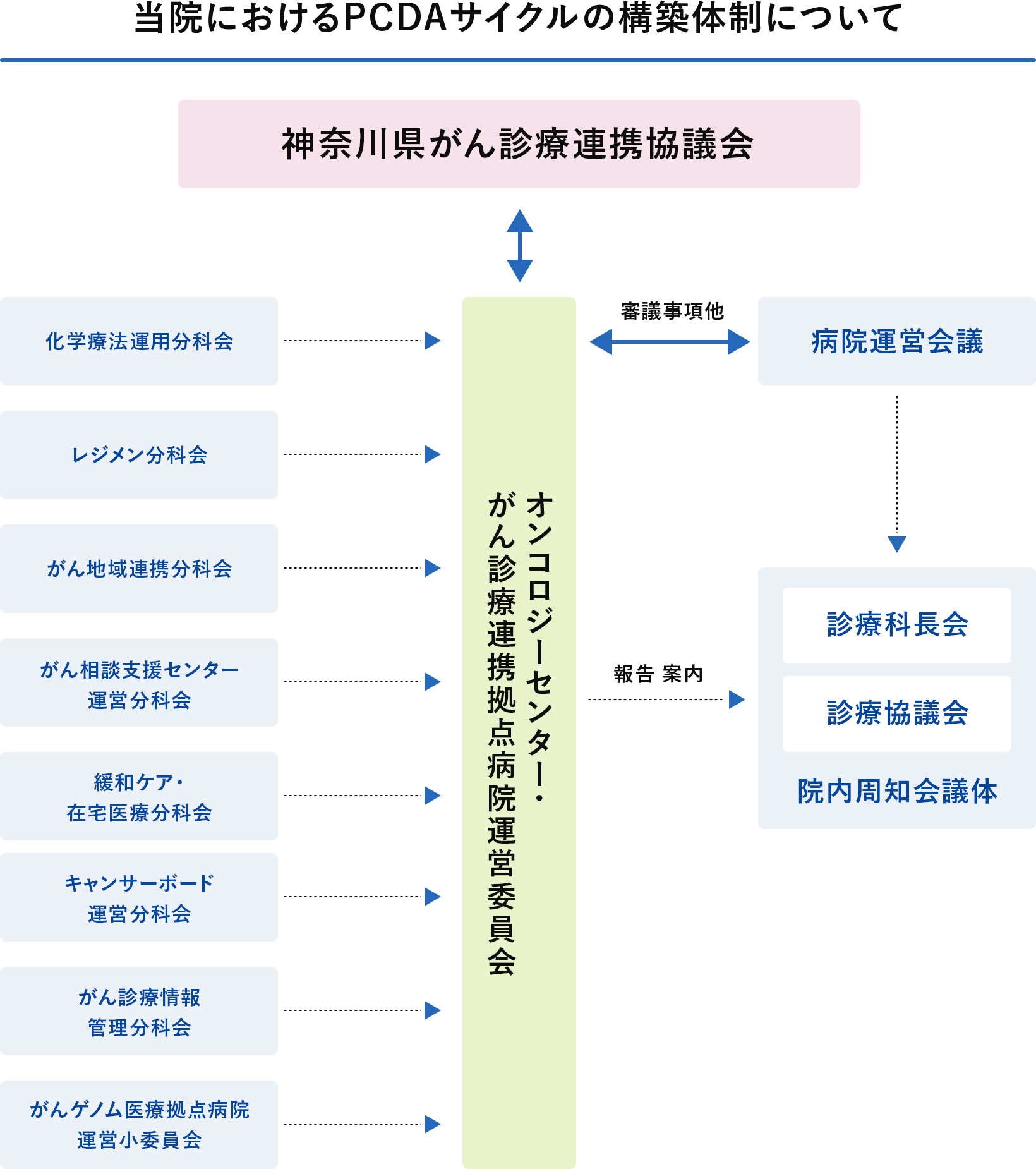がん診療への取り組み ~がん診療連携拠点病院~
はじめに
当院は「地域がん診療連携拠点病院」の役割を担い、地域のがん診療の中心となる施設として、住民の皆様に質の高いがん医療を提供するとともに、当院で行っているがん治療に関する情報を公開することで、患者さんが安心してよりよい治療を受けられるよう、努力しています。
がんゲノム医療について
当院は2019年9月19日付けで「がんゲノム医療拠点病院」に指定されており、保険適応になったがん遺伝子パネル検査を実施しています。がんゲノム医療拠点病院には以下の役割があります。
-
臨床研究・治験の実施、新薬の研究開発協力
-
遺伝子パネル検査の実施
-
がん患者さんに対する情報提供
-
他施設と連携し、適切ながんゲノム医療を提供
がん遺伝子パネル検査とは、がん細胞に起きている遺伝子の変化を調べ、その特徴を知ることで、個々の患者さんに適した治療法を検討するための検査です。
がん遺伝子パネル検査は国が指定する医療機関以外では実施できません。また、対象も標準治療が確立されていない稀少がんや原発不明がん、もしくは標準治療で効果がなかった固形がん(白血病、悪性リンパ腫等の血液がん以外)に限定されています。さらに検査結果をもとに化学療法(抗がん薬治療)が実施できる状態にあると、主治医が判断した患者さん以外は検査を受けられません。
なお、検査を実施しても、有効な治療法が見つかる割合は低い現状ではありますが、国を挙げて情報収集し研究を重ねて開発中の新しい医療です。詳しくは主治医にご相談ください。
AYA世代の治療について
AYA世代(15歳~40歳前後)の患者さんに対しては、がんの治療そのものだけではなく、妊孕性の温存や就学・就労の支援を含めた診療体制の提供と相談支援を行っております。
がん診療を行う診療科
-
肺がん
-
甲状腺がん
-
胃がん
-
卵巣がん
-
原発不明がん
-
頭頚部がん
がん診療連携拠点病院とは
がん対策は、平成19年4月に施行された「がん対策基本法」の基本理念に則り推進されています。そのなかで、厚生労働省は、全国どこでも質の高いがん医療を提供することができるよう、「がん診療連携拠点病院」の整備を進めてきました。
当院はがん対策基本法の施行に先立ち、平成19年1月31日より「地域がん診療連携拠点病院」に指定されております。
「地域がん診療連携拠点病院」の役割
-
専門的ながん医療の提供
-
地域における診療連携協力
-
がん患者さんに対する相談支援および情報提供
-
院内がん登録への情報登録(予後調査を含む)および利用
がん対策基本法(第一章第二条)の基本理念
-
がん克服を目指し、がんに関する専門的、学際的または総合的な研究を推進すると共に、がんの予防、診断、治療等に係る技術の向上その他の研究等の成果を普及し、活用し、発展させること。
-
がん患者がその居住する地域にかかわらず、等しく科学的知見に基づく適切ながんに係る医療を受けることができるようにすること。
-
がん患者のおかれている状況に応じ、本人の意向を十分尊重してがんの治療方法等が選択されるよう、がん医療を提供する体制の整備をおこなうこと。
PDCAサイクルの構築体制



